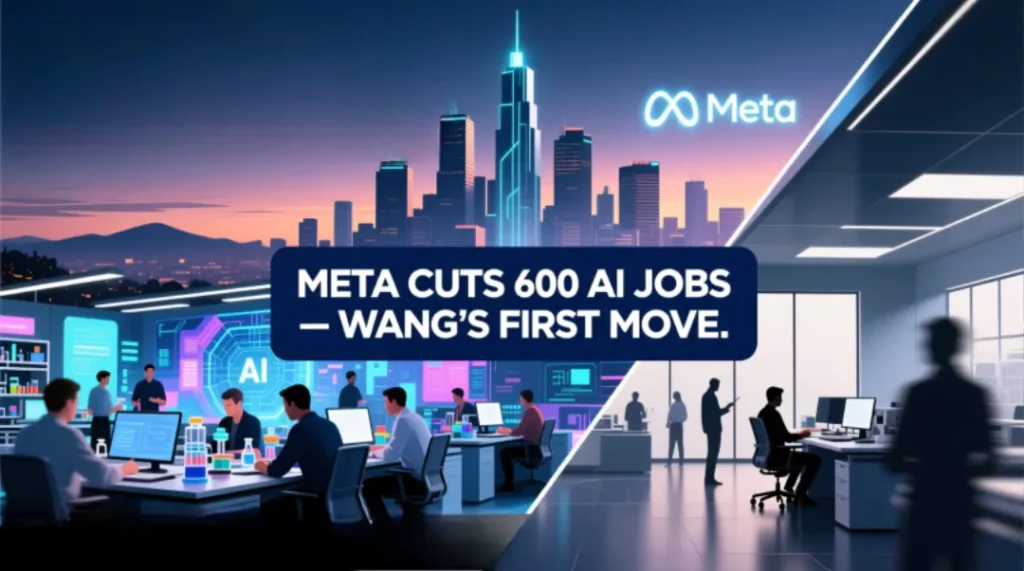SAN FRANCISCO Meta Platforms is cutting around 600 jobs from its artificial-intelligence operations, according to internal memos seen by multiple outlets. The move marks a significant step in the company’s wider Meta AI layoffs and is chief among the earliest major actions by newly appointed chief AI officer Alexandr Wang
Meta AI Layoffs Hit Superintelligence Labs Hard
The bulk of the cuts target the formerly high-profile Superintelligence Labs unit, which grew rapidly this year amid Meta’s push toward next-gen models. Teams in foundational research including Facebook AI Research, or FAIR, product-AI, and infrastructure are also impacted though Meta’s newer elite team, the TBD Lab, is reportedly spared.
In his memo, Alexandr Wang wrote, “By reducing the size of our team, fewer conversations will be required to make a decision, and each person will be more load-bearing and have more scope and impact.”
Alexandr Wang’s First Move as CAIO: Streamlining Post-Meta AI Layoffs
Wang, hired this spring after previously leading data-label startup Scale AI in which Meta also invested, has been under pressure to show tangible progress in Meta’s AI strategy.
His appointment, often informally referred to as the “Alexandr Wang Meta” era signaled Meta’s intent to overhaul its AI organisation. The Meta AI layoffs are seen as his first major structural step. Internally, sources say the AI org had grown too large and diffuse, with overlapping groups chasing similar goals. “There were three different groups trying to build nearly the same model,” said one person briefed on internal discussions.
Inside Meta’s Streamlining Push Following AI Layoffs
While the headcount cut is dramatic, Meta is framing the change as strategic, not purely cost-cutting. The company is encouraging affected employees to apply for new roles internally, and reports suggest most will find another position inside Meta.
Meta’s spokesperson confirmed that the TBD Lab — the group focused on large-scale models and infrastructure will not be part of this layoff wave.
Zuckerberg’s AI Strategy Still Full Steam Ahead
Mark Zuckerberg has long emphasised that Meta’s competitive edge in the AI arms race lies in speed, scale, and elite talent. His strategy of “small, talent-dense teams” aligns with Wang’s memo language.
Even as the company cuts in some areas, hiring continues in others notably in high-end AI research and engineering roles that Meta is acquiring through AI talent poaching from competitors. Meta has reportedly offered major packages to engineers and researchers previously with OpenAI, Google DeepMind, and other top labs.
A Valley Trend: Fewer Moonshots, More Cuts
Meta’s move comes amid a broader industry pull-back in AI staffing across Silicon Valley. Other tech firms have trimmed once-bloated AI research groups too, as the emphasis shifts from pure moonshots toward deliverable product systems and tighter cost control.
What makes Meta’s cut notable is the scale and timing: a major public commitment to AI infrastructure and ambition followed by a large internal re-organisation. Some analysts view the 600-job reduction as a signal that Meta’s early “AI hype cycle” may be maturing into something more business-driven.
Scale AI Roots and What Comes Next
Meta’s earlier investment in Scale AI — and the subsequent hiring of Wang — now look more like carefully orchestrated moves in a long game. The restructuring underscores Meta’s shift from broad-based hiring to targeted, high-impact research and product pathways.
For now, Meta appears to be betting that “less bloat means more speed.” Whether that gamble pays off hinges on how effectively Wang and his team can rebuild around streamlined teams and sharper priorities. In the rapid-fire world of Silicon Valley AI, that’s the hard part.
Looking Ahead
Meta will report its results for Q3 on October 29, 2025, and many in the Valley will be watching how management frames this re-org’s impact in its upcoming earnings call.

